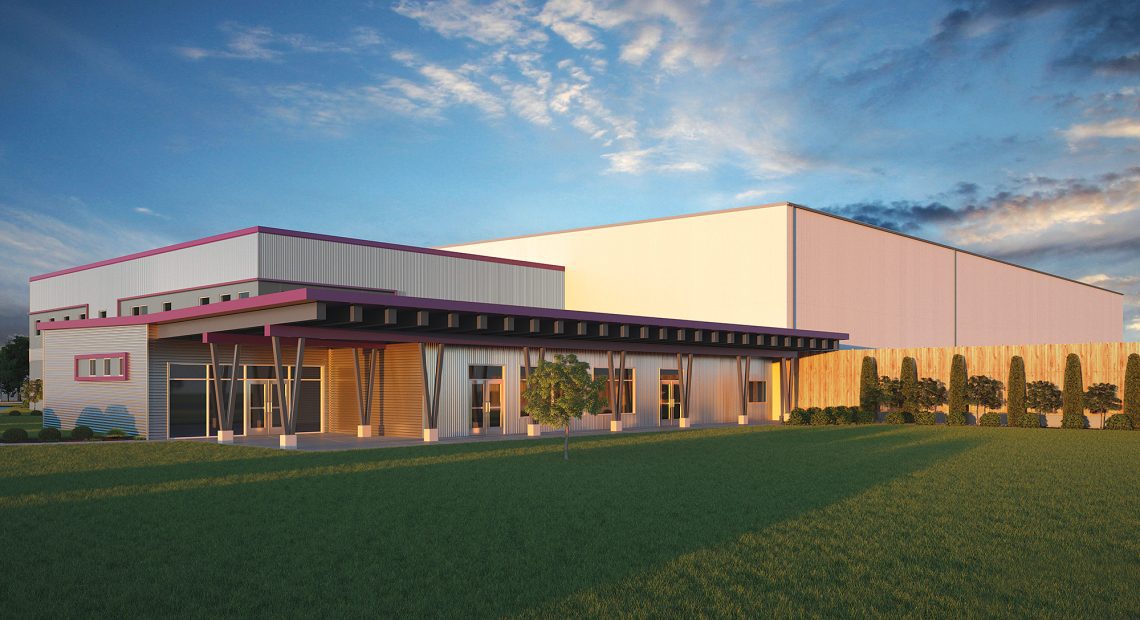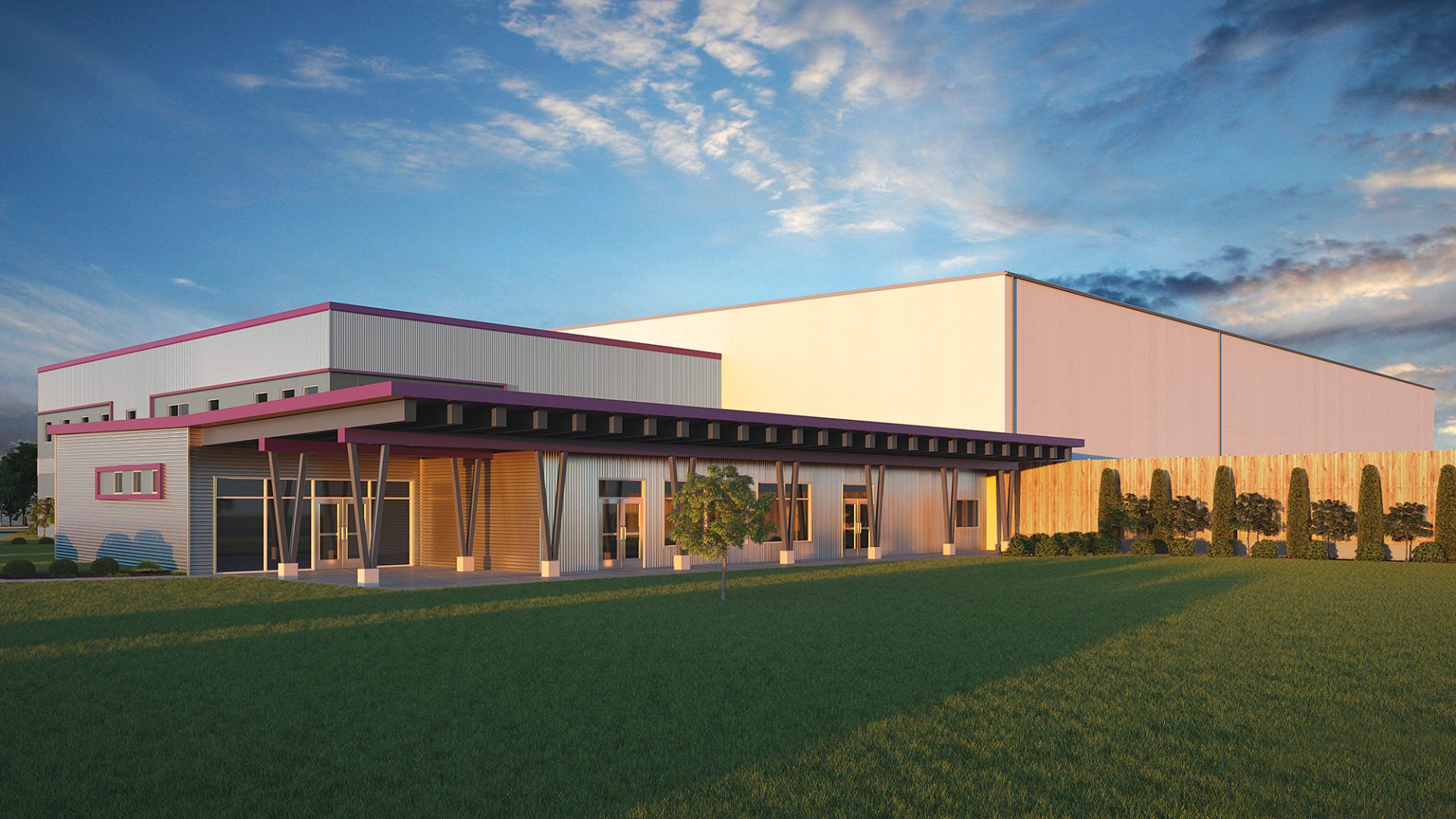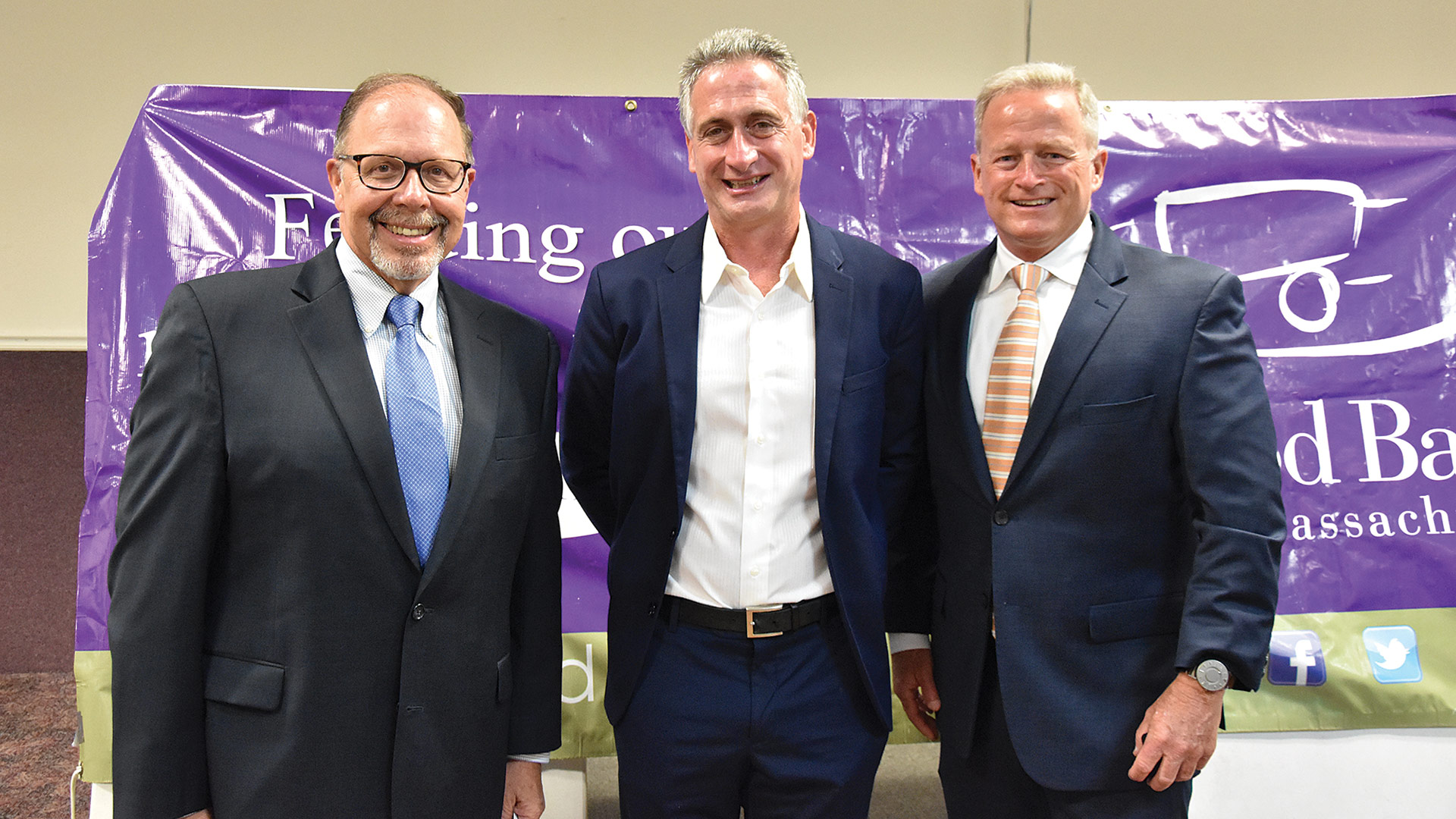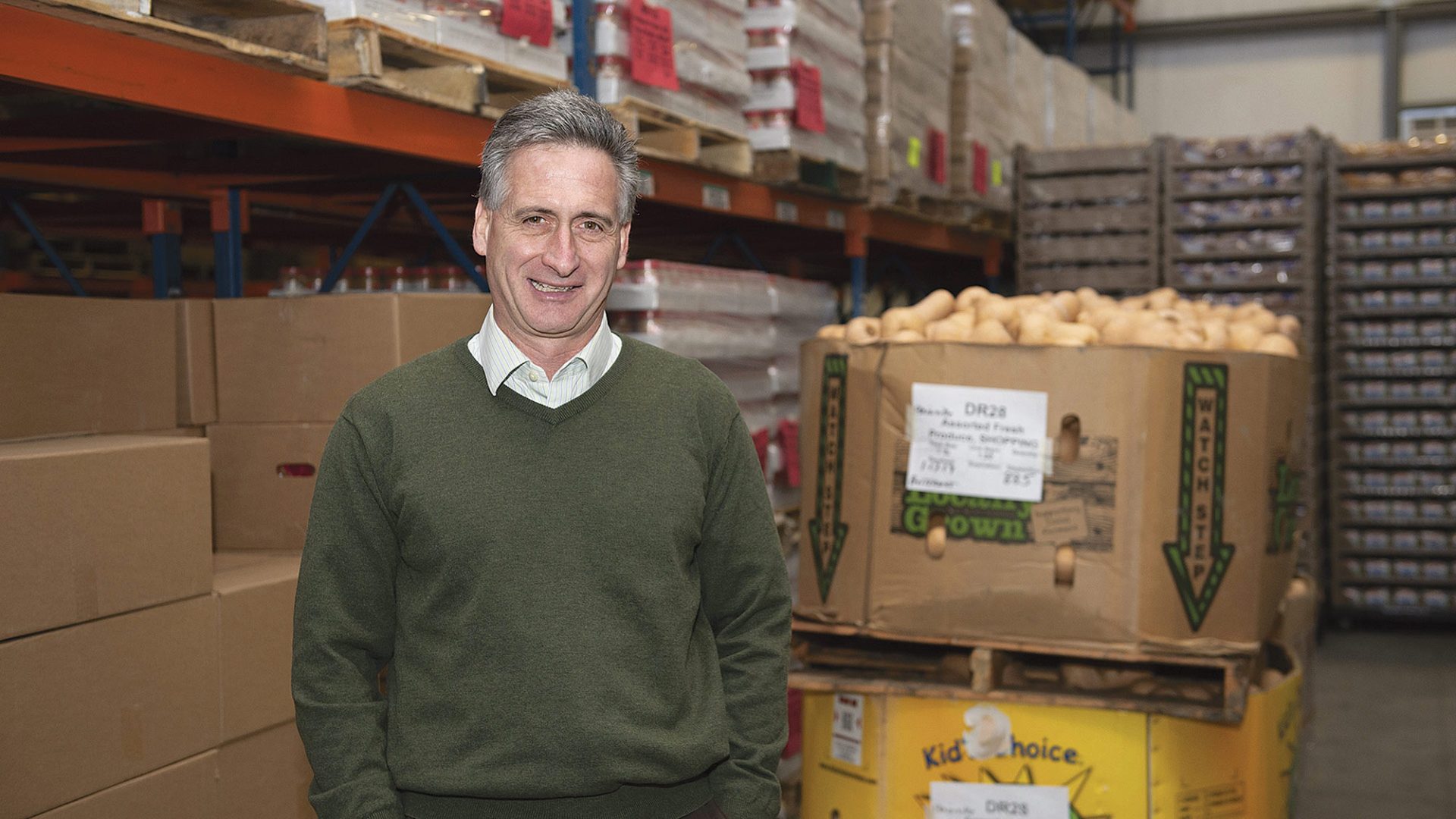
The Food Bank of Western Massachusetts Moves Closer to a New Home
Growth Is on the Menu

A rendering of the future Chicopee home of the Food Bank of Western Massachusetts, set to open in 2023.
While it manages an impressive flow of food from numerous sources to the people who need it most, in recent years, the Food Bank of Western Massachusetts has been doing that job in a space that’s not sufficient for the work. That will change with the opening, in 2023, of a new headquarters in Chicopee that will more than double the organization’s space and allow it to serve more people with more food and more nutrition and educations — in effect, expanding the menu of what’s possible at a time when the need is great.
The Food Bank of Western Massachusetts was launched in a Hadley barn 40 years ago. Four years later, it relocated to its current facility in Hatfield.
Today, as one of four regional food banks in Massachusetts, the organization provides food to 172 food pantries, meal sites, and shelters in Berkshire, Franklin, Hampden, and Hampshire counties. Its food sources include the state and federal government, local farms — including two of its own — retail and wholesale food businesses, community organizations, and individual donations.
The organization also provides other forms of food assistance, such as nutrition workshops, Supplemental Nutrition Assistance Program (SNAP) enrollment assistance, and education, public-policy advocacy, and engagement around issues of food insecurity.
That’s a lot of food and a lot of people being served, and not enough space to do it all. In fact, the Food Bank has had to turn away about a million pounds of food donations over the past three years, said Andrew Morehouse, its executive director.
The need for a new facility is nothing new, but the reality of one is finally on the near horizon, with a $19 million, 63,000-square-foot facility breaking ground in Chicopee next month and set to open next year, more than doubling the organization’s current 30,000 square feet of space.
Those are gratifying numbers, Morehouse said.
“This is a project we’ve been planning for probably six years, when we realized we were beginning to run out of space here at the facility in Hatfield. So we began the process of figuring out what we needed to do,” he told BusinessWest. “Do we want to expand the facility in Hatfield or purchase or build a second facility in Hampden County? Can we operate two facilities? If we can’t, are we prepared to move to the Springfield area?”
About three years ago, the Food Bank decided to move to Hampden County, for multiple reasons. “One is because it’s right at the crossroads of two major interstates, which facilitates loads of food to and from the Food Bank. We distribute large amounts of food, tens of thousands of pounds of food every day — over a million pounds every month.”
“It’s right at the crossroads of two major interstates, which facilitates loads of food to and from the Food Bank. We distribute large amounts of food, tens of thousands of pounds of food every day — over a million pounds every month.”
In addition, Hampden County boasts the region’s largest concentration of people facing food insecurity. “For that reason as well, we said, ‘we really need to be in Hampden County,’” Morehouse explained. “We’ve been an upper Pioneer Valley organization, even though we serve all four counties, and this affords us the opportunity to raise our visibility in Hampden County.”
More than two years ago, the Food Bank honed in on a building for sale on Carando Drive in Springfield and made an offer to purchase, but backed out after the inspection stage. “So we went back to the drawing board,” he said, and that process eventually brought the nonprofit to a parcel of land at the Chicopee River Business Park owned by Westmass Area Development Corp.

Andrew Morehouse (center) with Big Y CEO Charlie D’Amour (left) and Dennis Duquette, MassMutual Foundation president, when they announced pledges of $1.5 million each to the Food Bank’s capital campaign last year.
The space is plentiful — 16.5 acres, 9.5 of which are buildable, the rest protected as wetlands and greenspace. The Dennis Group had begun designing a building well before the land purchase (Thomas Douglas Architects also had a hand in the design), and C.E. Floyd, based in Bedford, will do the construction, with groundbreaking, as noted, likely to happen next month and the new facility expected to open in March or April 2023, with move-in complete by that summer.
“It’s twice the size of our current facility, which gives us the capacity to receive, store, and distribute more healthy food to more people for decades to come,” Morehouse said.
Special Deliveries
The Food Bank’s reach is impressive, serving as a clearinghouse of emergency food for all four counties of Western Mass., most distributed to local food pantries, meal sites, and shelters.
“It’s important to note that more than 50% of the food we distribute is perishable foods, like vegetables and frozen meats,” Morehouse noted. “And a lot of the non-perishable food is very healthy grains, pastas, beans, and nutritious canned food items, low in salt and sugar, for people who don’t have time to cook.”
Much of the food the organization collects is purchased, using state and federal funds, from wholesalers, local supermarkets, and three dozen local farms, from which the Food Bank purchased more than a half-million pounds of vegetables last year using state funds; farmers also donate another half-million pounds each year.
“It’s important to note that more than 50% of the food we distribute is perishable foods, like vegetables and frozen meats. And a lot of the non-perishable food is very healthy grains, pastas, beans, and nutritious canned food items, low in salt and sugar, for people who don’t have time to cook.”
“We’ve also increased our own capacity to distribute food directly,” Morehouse said. “Since the late ’80s, we’ve been providing food to seniors in 51 senior centers across all four counties, and we continue to do that. Every month, we send a truck and provide bags of groceries to 6,500 elders — about 16 food items to supplement elders who lived on fixed incomes. And in the last six or seven years, we initiated a mobile food bank where we send a truck once or twice a month to 26 sites in the four counties — 10 in Hampden County — and provide fresh vegetables and other food items to individuals who live in food deserts, neighborhoods that don’t have grocery stores where they can buy healthy food.”

Andrew Morehouse says moving food — tens of thousands of pounds of it a day — in and out of the Food Bank’s headquarters will be much more efficient in the new facility.
The federal government responded well to suddenly increased food-insecurity needs in the first year of the pandemic, Morehouse noted, but by late 2021, many of those expanded safety-net programs were sunsetting, at the same time inflation was sending food prices soaring. “We believe that will lead to another spike in demand for emergency food.”
He intends for the Food Bank of Western Massachusetts to meet that demand locally.
“This brand-new building is designed to maximize the efficiency of the flow of inventory. Over the last 30 years at our current facility, we’ve been expanding in a very small footprint in any way we can; this new property allows us to maximize efficiency and store more food and move food in and out more quickly and have more bays to receive food and distribute it quickly.”
And because combating hunger requires multiple lines of attack, Morehouse plans to use the additional space for expanded nutrition education programs as well, including a large demonstration kitchen. He also plans to hire more staff.
“We have partnerships with local hospitals and community health centers to address people with food insecurity. We’ll have more staff to help people apply for SNAP benefits and have more community space to accommodate workshops and community events.”
One of the project funding sources, a MassWorks grant to the city of Chicopee for site development, requires the building to have a physical public benefit, Morehouse noted. “So we’ve entered into an easement agreement with the city where our parking lot and community room are available as emergency shelter in the event of a natural disaster.”
Speaking of funding, while the project budget is $19 million, the capital campaign aimed to raise $26.3 million, which includes financing, furniture, fixtures, equipment, legal costs, accounting, and fundraising. Of that, more than $25 million has already been pledged. Large earmarks included $5 million in federal American Rescue Plan Act funds and $1.6 million from Chicopee’s coffers.
“Mayor [John] Vieau has repeatedly said how proud he is that the city of Chicopee will become the hub for food insecurity for the four counties of Western Massachusetts,” Morehouse said.
Other sources of funding include a New Market Tax Credit investment program, which will raise $4.2 million from investors, as well as support from individuals foundations, and businesses, he explained. “Lastly, the Food Bank will invest the proceeds from the same of our current building to the campaign.”
When MassDevelopment issued a $9.5 million tax-exempt bond for the project earlier this month, MassDevelopment President and CEO Dan Rivera noted that “more residents of Western Massachusetts will soon be able to access nutritious food and supportive services with the construction of this bigger, modern Food Bank. MassDevelopment is proud to deliver tax-exempt financing to help the Food Bank of Western Massachusetts fulfill its mission of addressing food insecurity and empowering people to live healthy lives.”
“This is a great project to be a part of,” added Matthew Krokov, first vice president of Commercial Banking at PeoplesBank, which purchased the bond. “The Food Bank plays a vital role in alleviating food insecurities in our region, and this investment in the Food Bank’s future home will help provide better access for individuals in our community.”
Food for Thought
The project, like any large construction project these days, has run into supply-chain obstacles that have caused delay and boosted costs, but Morehouse and other stakeholders finally see it coming into focus — and not a moment too soon for an organization that provided 11.6 million meals in 2021, reaching an average of 103,000 individuals per month.
“We are excited the Food Bank of Western Mass. has chosen the Chicopee River Business Park to relocate their operations and headquarters,” Vieau said. “I can think of no better place in terms of access, efficiency, and accessibility than right here in Chicopee, at the crossroads of New England.” u
Joseph Bednar can be reached at [email protected]





